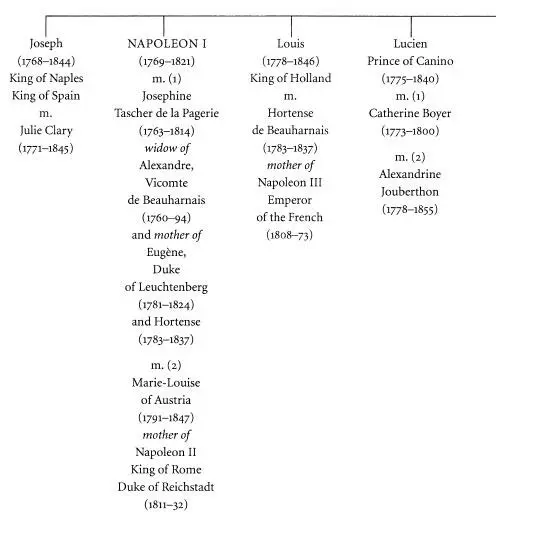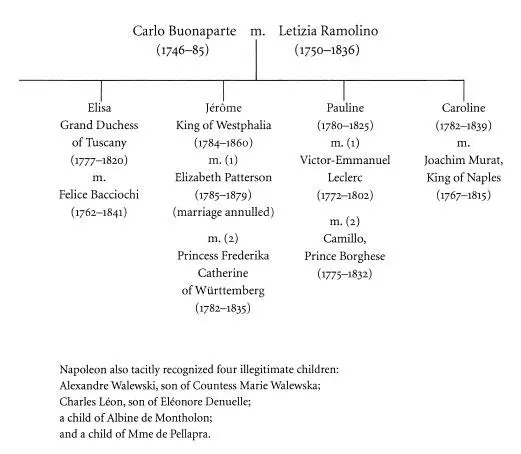HIS WIVES AND WOMEN

For Peter and Nanette
with love
Cover Page
Title Page Napoleon HIS WIVES AND WOMEN
The Bonaparte Family Tree The Bonaparte Family Tree
1 THE CREOLE
2 THE DOOMED MARRIAGE
3 THE CITOYENNE BEAUHARNAIS
4 THE CORSICAN BOY
5 A PROSTITUTE AND A PEST
6 THE ‘ADORABLE FRIEND’
7 CHEZ LES PERMONS
8 PARISIAN SALONS
9 ADVENTURES IN ITALY
10 THE SERBELLONI PALACE
11 THE FAVOURITE SISTER
12 CAROLINE
13 ‘PEACE À LA BONAPARTE’
14 LIFE IN THE RUE DE LA VICTOIRE
15 ‘LA PUTANA’
16 A CONVERSATION WITH JUNOT
17 ‘CLEOPATRA’
18 THE GENERAL’S RETURN
19 THE COUP
20 DAYS AT MALMAISON
21 ASSASSINS AND VICTIMS
22 MISTRESSES AT COURT
23 THE IMPERIAL HIGHNESSES AND MADAME MÈRE
24 CORONATION
25 ADOPTED AND NATURAL SONS
26 LIFE AT COURT
27 MARIE WALEWSKA
28 PRELIMINARIES OF DIVORCE
29 SISTERS AND SISTERS-IN-LAW
30 SEPARATION
31 MARIE-LOUISE
32 MARRIAGE AND HONEYMOON
33 THE KING OF ROME
34 DISASTER IN RUSSIA
35 FUGITIVES
36 THE AUSTRIAN EQUERRY
37 THE DEATH OF JOSEPHINE
38 EXILE ON ELBA
39 MADAME MÈRE
40 PAULINE BORGHESE
41 QUEEN CAROLINE
42 DEFEAT AND EXILE
43 ST HELENA
44 LONGWOOD HOUSE
45 ‘MACH’ AND ‘SULTANA’
46 SEXUAL ADVENTURES
47 DREAMS AND MEMORIES
48 DEATH OF THE EMPEROR
49 ELISA AND CAROLINE
50 PAULINE AND MADAME MÈRE
EPILOGUE THE RETURN TO PARIS
APPENDIX POST MORTEM
THE FATE OF CHARACTERS WHOSE END IS NOT RECORDED IN THE TEXT
CHRONOLOGY
BIBLIOGRAPHY
INDEX
Acknowledgements
About the Author
From the reviews:
By the same author
Copyright
About the Publisher
The Bonaparte Family Tree


‘She longs to see Paris and has
a very sweet disposition.’
‘CONTRARY TO OUR HOPES, it has pleased God to give us a daughter,’ Rose-Claire Tascher de La Pagerie wrote after the birth of her first child on 23 June 1763. The baby’s father, Joseph Tascher de La Pagerie, had wished for a son who might, as he himself had done, obtain a post as a page at court at Versailles – far away from the family’s sugar plantation on the West Indian island of Martinique. The mother had hoped that the birth of a boy might reconcile her husband to a marriage which was not a happy one, and which led him to seek such pleasures as could be found in Fort Royal, the capital of Martinique, where he was known to spend much of the day playing cards and was believed to spend the nights in bed with his black mistress.
In his plantation he took scant interest. His father had sailed out from France in 1726, having high hopes of making his fortune as so many Creoles – West Indians of European descent – contrived to do. But he was not a successful planter. Nor was his son and, by the time his grandchild was born, the plantation’s profits had fallen sharply, while the number of slaves, once as many as 150, summoned to work at half-past five every morning, had fallen to less than fifty.
These slaves, and the La Pagerie family, had all sought shelter in a stone-walled wind-house on the night of 13 August 1766 when devastating gales and a tidal wave tore across the island, killing over four hundred people, sweeping away the family’s mill and slave quarters and all the other wooden buildings of the plantation, and flattening the sugar canes, the mangoes, custard apples, tamarisks and bread-fruit trees.
The La Pageries’ large wooden house was not rebuilt and the upper floor of the refinery, above the clanking machinery crushing the sugar canes, became the three-year-old Rose’s home. Seven years later, after her mother had given birth to three more girls, Rose was sent to a convent school in Fort Royal where she was taught how to behave as a young lady would have been expected to behave in France, how to dance and sing and play the piano, how to use a fan and conduct a polite conversation; but to academic instruction not so much importance was attached.
When she was fourteen, Rose left the school at Fort Royal, and eagerly looked forward to leaving Martinique for a more exciting life in France. The opportunity to do so had been given to her by her aunt, Désirée, the mistress of a soi-disant marquis, François de Beauharnais, who had been appointed Governor of Martinique and of several nearby islands. Having, for propriety’s sake, married one of François de Beauharnais’s aides, Alexis Renaudin – who had thrashed her savagely when he discovered her ‘notorious conduct’ with the Governor and who had returned home to obtain a legal separation – Désirée followed him to France in order to enter a counter-plea and obtain a share of his money. Soon afterwards, François de Beauharnais and his wife also sailed for France, where Mme de Beauharnais went to live in the country on her family’s estate while her husband settled down in Paris with his mistress, Désirée Renaudin.
Désirée now set about arranging a marriage between one of her nieces in Martinique and her lover’s son. She accordingly asked her brother Joseph and his wife to send over from Martinique at least one of their daughters as a bride for Alexandre, then sixteen and a half years old. Alexandre thought that the second of the La Pagerie daughters, Catherine, aged twelve, would probably suit him best after a suitable Paris education; but Catherine died of tuberculosis before this could be arranged. Since her sister Rose was considered, at fourteen and a half, too near Alexandre’s own age, the youngest daughter, Manette, was then proposed. To be overlooked in this way was too much for Rose to bear. Usually so biddable and languorous, so lazily placid, she burst into frequent floods of tears until her father wrote to Alexandre’s family:
The oldest girl, who has often asked me to take her to France will, I fear, be somewhat upset by the preference given to her younger sister. She has a very fine skin, beautiful eyes, beautiful arms and an unusual gift for music. She longs to see Paris and has a very sweet disposition. If it were left to me I would bring the two daughters instead of one, but how can one part a mother from both her remaining daughters when death has just deprived her of a third?
So, in September 1779, Britain having declared war on France the year before, Joseph Tascher de La Pagerie, his daughter Rose, and a freed slave named Euphémie, sailed for Europe in the Île de France . After a fearful, three-month-long crossing of the Atlantic in appalling weather, constantly threatened with interception by the English fleet and in danger of capture by pirates, M. de La Pagerie’s weary party landed at Brest, where he immediately went to bed to await the arrival of his sister, Désirée, who, accompanied by his future son-in-law, Alexandre de Beauharnais, set out from Paris as soon as she heard that the Île de France had docked.
Читать дальше














